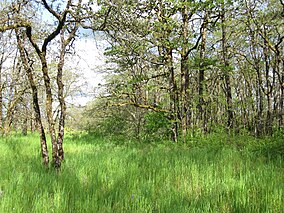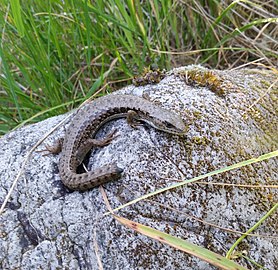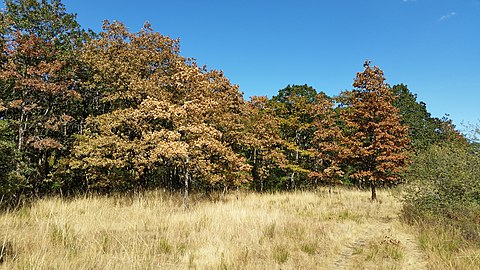| Scatter Creek Wildlife Area | |
|---|---|
 Garry oaks (Quercus garryana) bordering Scatter Creek Garry oaks (Quercus garryana) bordering Scatter Creek | |
 | |
| Location | Southwest Washington, Washington, United States |
| Coordinates | 46°49′59″N 123°00′25″W / 46.833°N 123.007°W / 46.833; -123.007 |
| Governing body | Washington Department of Fish & Wildlife |
| Website | Washington State Department of Fish & Wildlife - Scatter Creek Wildlife Area |
The Scatter Creek Wildlife Area is a multi-unit protected area and wildlife reserve in southern Thurston County, Washington. Covering seven units, the area is owned and managed by the Washington Department of Fish and Wildlife (WDFW).
Units
Black River Wildlife Area Unit
The Black River Wildlife Area Unit is located between Gate and Rochester, Washington on the Black River. Open for the fishing, hunting, and viewing of wildlife, the 120-acre (49 ha) grounds features a sedge meadow. The unit is also known as the Black River National Wildlife Refuge or as the Black River Habitat Management Area.
The Nature Conservancy purchased a pair of wetland tracts totaling 124 acres (50 ha) near the refuge in 2002.
Davis Creek Wildlife Area Unit
The Davis Creek Wildlife Area Unit is located near Oakville and contains numerous animal and bird species, including deer, elk, and various types of waterfowl. The 654-acre (265 ha) riparian unit is situated near the Chehalis River and visitors are able to fish and hunt on the grounds.
Glacial Heritage Wildlife Area Unit

The Glacial Heritage Wildlife Area Unit, also known as the Glacial Heritage Preserve, is located east of Mima, Washington between Littlerock and Rochester, directly south of the Mima Mounds Natural Area Preserve on the Black River. The 80-acre (32 ha) prairie grassland unit, to protect rare and threatened plant species located within the preserve, is open to the public only one day per year, known as Prairie Appreciation Day.
The southern end of the Gate to Belmore Trail is near the preserve and under plans by the county's Trail Connectivity Program, the pathway is to be extended by 1.6 miles (2.6 km) to the site. The project would connect the corridor of natural areas and preserves to the Yelm-Rainier-Tenino Trail and other hiking routes in the region.
Scatter Creek Unit
The Scatter Creek Unit is a 915-acre unit that is split into two sections, the North site and the South site and is located near Grand Mound, Washington and Rochester. The parcel is the site of a former homestead.
The Scatter Creek Unit is home to one of the few remaining sections of south Puget Sound prairie. Garry oaks (Quercus garryana). The oaks can be found growing in riparian areas, along with Oregon ash (Fraxinus latifolia). In the forested hills on the north side of the reserve, conifers such as Douglas fir (Pseudotsuga menziesii) predominate. Mima mounds can be found at both the North and South site.
Skookumchuck Wildlife Area Unit
The Skookumchuck Wildlife Area Unit is located downstream of the Skookuchuck Dam. The 883-acre (357 ha) parcel contains a mix of habitats, including grassland, forest, meadow, orchard, and wetlands. Various species in the unit include pheasant and elk, and salmon and steelhead exist in the Skookumchuck River. The unit is under a partnership agreement between the WDFW and the owner of the land, TransAlta. Hunting of fowl and fishing in the river is allowed.
Violet Prairie Wildlife Area Unit
The Violet Prairie Wildlife Area Unit is located east of Tenino. The 1,040-acre (420 ha) unit is closed to public access due to the necessity to determine how visitation would affect certain parts of the protected grounds. The preserve is home to the endangered Mazama pocket gopher as well as various creatures listed under the Species of Greatest Conservation Need program, including the Oregon vesper sparrow, and butterflies such as the Puget blue, and the Taylor's checkerspot.
West Rocky Prairie Unit
The West Rocky Prairie Unit is located near Tenino. The unit is 119.0 acres (48.2 ha) and contains Oregon white oak, Oregon ash, Douglas fir, and maple. In 2023, the WDFW undertook a tree-thinning operation to restore the prairie oak habitat by removing heavy densities of ash, fir, and maple. The project would also overhaul the roads in the parcel.
Gallery
-
 Northern alligator lizard (Elgaria coerulea)
Northern alligator lizard (Elgaria coerulea)
-
Camas (Camassia quamash)
-
White morph of Camassia quamash
-
 Garry oaks (Quercus garryana) with senescing leaves
Garry oaks (Quercus garryana) with senescing leaves
-
Controlled burn
References
- "Black River Wildlife Area Unit". Washington Department of Fish and Wildlife. Retrieved August 20, 2024.
- "Nature Conservancy buys 124 acres in watershed". Seattle Post-Intelligencer. Associated Press. April 7, 2002. Retrieved August 20, 2024.
- "Davis Creek Wildlife Area Unit". Washington Department of Fish and Wildlife. Retrieved August 20, 2024.
- "Glacial Heritage Wildlife Area Unit". Washington Department of Fish and Wildlife. Retrieved August 20, 2024.
- "Prairie Appreciation Days". Friends of Puget Prairies. Retrieved August 20, 2024.
- Bilbao, Martin (May 30, 2023). "Thurston County is designing trail extensions near Tenino, Glacial Heritage Preserve". The Olympian. Retrieved August 20, 2024.
- Washington Department of Fish and Wildlife
- "Skookumchuck Wildlife Area Unit". Washington Department of Fish and Wildlife. Retrieved August 20, 2024.
- "Violet Prairie Wildlife Area Unit". Washington Department of Fish and Wildlife. Retrieved August 20, 2024.
- The Chronicle staff (July 27, 2023). "WDFW to start forest thinning project to restore prairie habitat near Tenino". The Chronicle. Retrieved August 2, 2023.